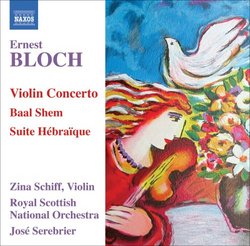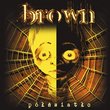| All Artists: Ernest Bloch, José Serebrier, Royal Scottish National Orchestra, Zina Schiff Title: Bloch: Violin Concerto/ Baal Shem/ Suite Hebraique Members Wishing: 1 Total Copies: 0 Label: Naxos Release Date: 10/30/2007 Genre: Classical Styles: Chamber Music, Forms & Genres, Concertos, Historical Periods, Modern, 20th, & 21st Century, Instruments, Strings, Symphonies Number of Discs: 1 SwapaCD Credits: 1 UPC: 747313275724 |
Search - Ernest Bloch, José Serebrier, Royal Scottish National Orchestra :: Bloch: Violin Concerto/ Baal Shem/ Suite Hebraique
 | Ernest Bloch, José Serebrier, Royal Scottish National Orchestra Bloch: Violin Concerto/ Baal Shem/ Suite Hebraique Genre: Classical |
Larger Image |
CD DetailsSimilar CDs
|
CD ReviewsA Lucky Find Micromegas | Ada, OK | 04/25/2008 (5 out of 5 stars) "Another tragically neglected 20th century violin concerto--and I mean tragically! It has incredible sweep and power, gorgeous melodies intertwined with an inexorable purpose (no mere note spinning here). I had never heard this concerto before, and only knew Bloch from his stunning Concerti Grossi, with which this piece has little in common. The piece opens with a fascinating melody, which Bloch claims was a Native American tune he picked up in New Mexico. If so, he has filtered it through his distinct musical personality, as it sounds unmistakably "him." The entire work inhabits a vaguely "Jewish" sound world, close to that of his famous cello & orchestra piece, Schelomo, which marries rhapsody with symphonic utterance. It's hard to know what to highlight--the beautiful solo line, the sumptuous orchestration, or the sincere depth of expression in the work. Far from being a soloistic display, the violin seems to interject passionately in a fiery drama from forgotten antiquity, or perhaps more pointedly, one of our more recent conflagrations. The concerto is coupled with two shorter pieces for violin and orchestra, both of which appear in various chamber guises. Yet here they perfectly complement the concerto's sound world and ethos, particularly Baal Shem, with its rhapsodic celebration of Jewish life. The Suite Hebraique is more expansive, almost seemingly like chips from Bloch's symphonic workshop. In short, beautiful pieces that can be lived in for years without discovering every fine, flawless detail. The Royal Scottish Orchestra has a long history of wonderful recordings, and this disc is no exception. They play with spirit and obviously want to give Bloch's negelected concerto its due. The soloist is marvelous and again, makes the strongest possible case for this concerto (it would make a happy discmate with Walton's concerto or even Sibelius). I bought it on a whim and it has encouraged me to be more spontaneous with my CD purchases! " Zina Schiff Plays Ernest Bloch Robin Friedman | Washington, D.C. United States | 05/25/2010 (5 out of 5 stars) "Born in Switzerland and a child prodigy on the violin, Ernest Bloch (1880 - 1959) spent much of his life in the United States. He is largely remembered for a small number of works with Jewish themes, but he deserves far more attention. Although infrequently performed today, Bloch's violin concerto (1938) is likely his masterpiece. The concerto receives an emotional, soaring reading on this CD by the American violinist, Zina Schiff together with Jose Serebrier conducting the Royal Scottish National Orchestra. Schiff was a student of Joshua Heifetz, and she has specialized in recordings of Jewish music. She plays with an appropriately wailing tone full of vibrato. Recorded in 2006, this CD has received deservedly glowing critical reviews, including a rating of 10/10 from "Classics Today". Schiff also wrote the excellent liner notes for this CD.
Bloch's violin concerto is a heavily late romantic work, intense, and sprawling. The first movement alone is in excess of 20 minutes. The concerto draws heavily on both American Indian and Jewish moods and themes. A simple progression of musical fifths is at the heart of the piece. The concerto uses the "cyclic" form associated with Caesar Franck, as its basic themes recur and are developed throughout the three movements. The outer two movements are marked "deciso". They wander in tempo and mood from slow and reflective to fiery. The middle movement, an "andante" is mystical, with the violin muted a good deal of the time. The orchestra makes large use of percussion, brass and winds, but the violin is at the center of this concerto. This is heartfelt, emotive music, and Schiff plays lyrically with fire and passion. The solo part is replete with long singing phases, double stops, and passages in the highest register of the instrument. She brings out the spiritual, questing character of the music, as the work moves from meditation and yearning to a conclusion of hope. Schiff and Serebrier also collaborate on two shorter and better-known works of Bloch for violin and orchestra. In 1923, Bloch composed a three-movement suite "Baal Shem (Three Pictures of Chassidic Life)" which he dedicated to his mother. The Baal Shem Tov was the legendary founder of Chassidism which aimed to reinvigorate Jewish life by emphasizing emotion, joy, and mysticism rather than only rationalism, learning and ritual. The three movements of Bloch's suite, Vidui (contrition), Nigun (singing or improvisation) and Simhat Torah (rejoicing for the giving of the Torah) are all in a distinctively Jewish idiom and capture something of the Jewish search for God. The emotion and spirituality of this music are open to all. Bloch's "Suite Hebraique" (1952) has become one of his more familiar works. It was initially written for viola and piano; but Bloch set it as well for viola and orchestra, and for violin, with piano or with orchestra. This is a three-movement work which captures the Jewish synagogue service, from its wailing, sing-song opening movement, through the dignified processional of the middle movement to the triumphal expression of faith in the finale. Schiff brings technical mastery and heart to the concerto and to the suites. This recording is a gift for listeners wanting to get to know an overlooked 20th Century romantic composer. Total time: 66:01 Robin Friedman" |




